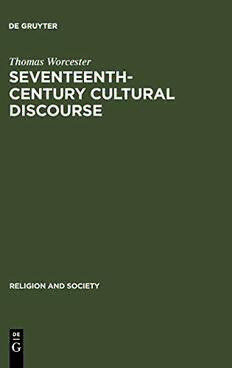
Seventeenth-Century Cultural Discourse PDF
Preview Seventeenth-Century Cultural Discourse
Seventeenth-Century Cultural Discourse w DE G Religion and Society 38 General Editors Luther Martin, University of Vermont Jacques Waardenburg, University of Lausanne Mouton de Gruyter Berlin · New York Seventeenth-Century Cultural Discourse France and the Preaching of Bishop Camus by Thomas Worcester Mouton de Gruyter Berlin · New York 1997 Mouton de Gruyter (formerly Mouton, The Hague) is a Division of Walter de Gruyter & Co., Berlin. © Printed on acid-free paper which falls within the guidelines of the ANSI to ensure permanence and durability. Library of Congress Cataloging-in-Publication Data Worcester, Thomas. Seventeenth-century cultural discourse : France and the preaching of Bishop Camus / by Thomas Worcester, p. cm. - (Religion and society ; 38) Includes bibliographical references and index. ISBN 3-11-015220-7 (cloth ; alk. paper) 1. Catholic Church — France — Sermons — History and criticism. 2. Camus, Jean-Pierre, 1584—1652. I. Title. II. Series; Religion and society (Hague, Netherlands) ; 38. BV4208.F8W67 1997 251'.0092—dc21 97-6660 CIP Die Deutsche Bibliothek — Cataloging-in-Publication Data Worcester, Thomas: Seventeenth-century cultural discourse : France and the preach- ing of Bishop Camus / by Thomas Worcester. — Berlin ; New York : Mouton de Gruyter, 1997 (Religion and society ; 38) ISBN 3-11-015220-7 © Copyright 1997 by Walter de Gruyter & Co., D-10785 Berlin All rights reserved, including those of translation into foreign languages. No part of this book may be reproduced or transmitted in any form or by any means, electronic or mechanical, including photocopy, recording or any information storage and retrieval system, without permission in writing from the publisher. Printing: Arthur Collignon GmbH, Berlin. Binding: Lüderitz & Bauer, Berlin. Printed in Germany. Acknowledgements and dedication I would like to thank those who have read and criticized earlier drafts of this book: Peter Burke, Michael Robson, Peter Bayley, Robin Briggs, Franco Mormando, as well as three anonymous referees for Mouton de Gruyter's Religion and Society series, and two editors of the series, Luther Martin and Donald Wiebe. Special thanks are also due to John O'Malley for his encouragement at an early and decisive stage of my research. I am indebted to all of these scholars; though I trust that they may recognize the fruit of their comments in the following pages, responsibility for the final text is mine. I gratefully acknowledge permission to incorporate parts of two articles I have published elsewhere: "A Sunday feast: Alimentary discourse in the preaching of Bishop Jean-Pierre Camus", Seventeenth- Century French Studies 15 (1993): 99-114; "Bishop Jean-Pierre Camus (1584-1652) and the Christianization of rural France", La christianisa- tion des campagnes, ed. Jean-Pierre Massaut - Elisabeth Henneau (Brussels: Institut Historique Beige, 1996): 345-354. I also thank the Daughters of the Charity, of the rue du Bac in Paris, for permission to cite letters of Bishop Camus to their foundress, Louise de Marillac. The Houghton Library of Harvard University I thank for permission to print as a frontispiece the engraving of Jean-Pierre Camus in Charles Perrault's Les hommes illustres qui ont paru en ce siecle (1696-1700). Thanks also go to sources of material support. These have included the American Friends of Cambridge University, the Prince Consort and Thirlwall Fund, the Lightfoot Fund, the Cambridge Historical Society, and especially the Society of Jesus. The warm hospitality of the Maison Jean-Marie Vianney, in the diocese of Belley, made access to rare editions of Camus's works a particularly pleasant endeavor. A generous research leave from the College of the Holy Cross made timely completion of the manuscript possible. The book is dedicated to my parents, Charles and Janice Worcester, and to Reverend William Worcester: student at Cambridge University, emigrant from England in 1639, preacher, founder of the first parish in Salisbury, Massachusetts. Thomas Worcester Contents Introduction 1 Chapter 1 Camus and context 5 1. Early seventeenth-century France 5 2. Preaching and religious culture 9 2.1 Council of Trent 11 2.2 Bishops after Trent 15 2.3 Religious culture 23 3. Camus: family and biography 26 Chapter 2 Oral discourse and printed text 34 1. Camus's publications 34 1.1 Fiction 35 1.2 The Diversitäs 35 1.3 Preaching 38 1.4 Other works 39 2. Camus as itinerant preacher 42 3. From oral discourse to printed text 46 3.1 Camus's prefaces 46 3.2 Reception of oral discourses 50 3.3 Reception of printed sermons 53 4. Language, genre, style 57 4.1 Language 57 4.2 Genre 59 4.3 Style 62 Chapter 3 Culture and conversion 66 1. Conversion and confession 66 1.1 Sin and self-knowledge 67 1.2 Contrition 70 1.3 Confession of sins 73 2. Penitential works 75 2.1 Works 76 2.2 Prayer 77 viii Contents 2.3 Alms 80 2.4 Fasting 84 3. Examples of conversion 84 4. Clergy and conversion 87 4.1 Cathedral chapter 87 4.2 Ordination 89 4.3 Diocesan synod 91 5. Culture and conversion 93 Chapter 4 Feasting and fasting 98 1. Lent 98 1.1 Premieres homilies quadragisimales 99 1.2 Belley, Lent 1616 105 2. Sunday homilies 113 3. Corpus Christi 120 4. Liturgical year 127 Chapter 5 Gender and the saints 131 1. Mary 132 1.1 Notre-Dame de Myans 133 1.2 Premieres homilies mariales 139 2. Female holiness 143 3. Male holiness 150 Chapter 6 Loyola and Borromeo 159 1. Ignatius of Loyola 160 2. Charles Borromeo 170 Chapter 7 Politics and piety 181 1. Estates General 182 1.1 Three simonies 182 1.2 Three scourges 185 1.3 Three disorders 188 2. Monarchy 191 3. France 198 4. Paris 205 Chapter 8 Hearts and minds 213 1. An older Camus 214 Contents ix 2. Missions to New France 225 3. Missions within old France 231 Conclusion 241 Notes 248 References 258 Index 294
